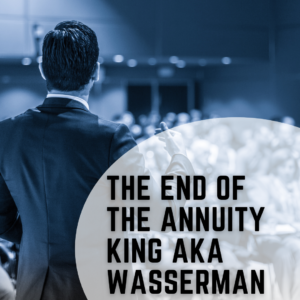 Phillip Roy Wasserman, the man who called himself the “Annuity King,” is headed to prison. As a business ethics keynote speaker, business ethics consultant and business ethics book author, I find his crimes more than “just fraudulent.” Wasserman destroyed lives. He robbed families of their savings and dignity. He destroyed them of life itself.
Phillip Roy Wasserman, the man who called himself the “Annuity King,” is headed to prison. As a business ethics keynote speaker, business ethics consultant and business ethics book author, I find his crimes more than “just fraudulent.” Wasserman destroyed lives. He robbed families of their savings and dignity. He destroyed them of life itself.
If the U.S. Attorney’s Office in Sarasota, Florida, Wasserman may leave jail in time for the end of his own life.
According to the Sarasota Herald-Tribune he faces:
“A maximum penalty of 20 years in prison on each of the conspiracy, mail fraud and wire fraud counts. Prosecutors are also seeking at least $6.3 million in monetary judgment, which is the amount they believe Wasserman bilked out of elderly investors.”
The Annuity King
There was nothing ethically legitimate about Wasserman. His so-called “insurance venture” which was supposed to pay a solid annuity-like return, was a Ponzi scheme. Again, according to news reports, he took investor money and funded luxury trips, season’s tickets, sports equipment and a beach house.
The important aspect of what he did is “promotion.” As a business ethics keynote speaker, business ethics consultant and business ethics book author, I warn audiences to not be taken in by fancy advertising, but by industry credentials, performance and professional association. In other words, having a “know-it-all brother-in-law” vouching for a character like this, is not a viable investment strategy.
The fraudster in this case held numerous investment seminars where he specifically targeted naïve, elderly investors. He “wowed them” with big promises, paid off the initial investors with annuity interest and raked off millions in dollars. Allegedly they paid Billy Ray Cyrus to be a celebrity spokesperson to help push their organization.
The IRS charged Wasserman in November 2022 with filing fraudulent income tax returns and for evasion of taxes and lying to investigators. He did have a co-defendant who helped him with the scheme who, in July 2021 pleaded guilty to wire fraud and mail fraud.
In order for the Ponzi scheme to work, the co-defendant stupidly aided Wasserman in the preparation of tax returns and lying to prosecutors. He eventually had the wisdom to confess to the government and he is now facing sentencing in June 2023.
The lack of oversight and conscience
Wasserman and his partner named the company “FastLife.” No one checked the honesty of their advice, but they counselled all of their potential investors to “liquidate traditional investments and borrow funds against their life insurance policies.” It was an irrational and irresponsible strategy especially for those in retirement. No one, it seemed, had the common sense to stop, mid-stream and question the stupidity of what was being proposed.
At the same time, the fraudsters were giving out such advice, they were evading their own taxes. Not surprising, and this is often the case, they carried two sets of books and faked the financial reports of their organization. Of course, they never divulged their own indebtedness to creditors and clients.
Allegedly, the defendants accused some their investors to lie to investigators about their investments and annuity performance. This too, was a major mistake in judgment.
Wasserman and his partner, had a need to grab as much money as possible as quickly as possible. They were without conscience save for a consciousness of what money could do for them. If, ethically, you might be looking for a sense of right and wrong here, it can’t be found. Perhaps you are wondering how they could rationalize their behavior? Don’t bother. As a business ethics keynote speaker, business ethics consultant and business ethics book author, I will try to convey that the mindset of a scam artist does not fit into the framework of a logical rationalization.
The lack of ethical behavior and ethical judgment permeates every aspect of this scandal. The crooks were, in fact, enabled by the clueless clients. In the end, many good people lost their life savings.
LEAVE YOUR COMMENTS!



So what happened to wasserman ??? When does he report to federal prison ?